Papers by Madelaine C Cahuas
The Professional Geographer
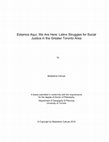
The Latin American or Latinx population is one of the fastest growing ethnic groups in Canada. Ye... more The Latin American or Latinx population is one of the fastest growing ethnic groups in Canada. Yet, there is a persistent lack of spaces and opportunities for Latinx people to gather, build community and mobilize politically in one of the most diverse urban centres in Canada, the Greater Toronto Area (GTA). At the same time, Latinx people have worked against this invisibility by carving out spaces in the city through the non-profit sector, where they have established numerous organizations, programs, networks and grassroots collectives. It is well documented how neoliberalization has negatively impacted the non-profit sector by coopting community agendas and suppressing social justice activism, and these effects have also been seen in the Latin American-serving non-profit sector. What is not well understood is how Latinx women and non-binary people negotiate and resist not only neoliberalization, but multiple forces of oppression, like heterosexism, racism and settler colonialism, t...

Gender, Place & Culture, 2020
Abstract This paper explores how a multiracial network of women and non-binary Latinx Community W... more Abstract This paper explores how a multiracial network of women and non-binary Latinx Community Workers (LCWs) envision and enact social change in Toronto, Canada. I demonstrate how LCWs articulate and implement an intersectional feminist and decolonial politic in their community organizing practices, from remaking a non-profit organization and creating spaces of mutual support, hope, healing and love. I argue that these social-spatial struggles collectively form Latinx decolonial feminist geographies that reach for Gloria Anzaldúa’s El Mundo Zurdo. I situate El Mundo Zurdo as a Latinx decolonial feminist and geographical theory of social change and bring it into conversation with feminist, Black and Indigenous geographies. Overall, this paper deepens understandings of Latinx geographies in theory and practice and demonstrates how Latinx geographies can work toward decolonial feminist futures.

Environment and Planning D: Society and Space, 2020
This paper explores the tensions racialized migrants negotiate when politically organizing and en... more This paper explores the tensions racialized migrants negotiate when politically organizing and enacting citizenship within the context of the Canadian white settler state. I focus on the experiences of Latin Americans in Toronto and the politics surrounding a cultural celebration – Hispanic Heritage Month. While some Latin Americans sought to use this event to gain recognition and assert their belonging to Canadian society, others opposed its naming, objectives and organization, and opted to create an alternative celebration – the Latin-America History Collective’s Día de la Verdad/Day of Truth Rally. I demonstrate that the narratives and practices mobilized around Hispanic Heritage Month and Latin-America History Collective’s Rally reveal how different forms of migrant political organizing can internalize, reproduce and contest white settler colonial social relations. Overall, this paper aims to contribute to and complicate debates on the fraught nature of racialized migrants’ citi...

Geoforum, 2018
Abstract This paper explores how one neighbourhood revitalization initiative addresses – or fails... more Abstract This paper explores how one neighbourhood revitalization initiative addresses – or fails to address – intersecting systems of oppression as it seeks to facilitate resident-led change. Unlike many similar initiatives, the Neighbourhood Action Strategy in Hamilton, Ontario, Canada has an explicit focus on grassroots community development and resident leadership, and actors within the strategy have paid significant attention to issues of inclusion. We draw on in-depth interviews with City staff, local service providers, and neighbourhood residents, as well as on observation of neighbourhood meetings and media analysis, to explore how diversity, inclusion, and equity are understood and managed by different actors within the Strategy. We demonstrate that despite a stated mandate of inclusion, the initiative often struggles to engage significant participation from working-class and racialized people. We argue that this is in part due to complex interpersonal and institutional dynamics informed by race and class, which create significant tensions that ultimately limit the initiative's ability to create meaningful transformation. We conclude with some lessons learned about how to disrupt the racist, classist, and other oppressive discourses that can operate even within the most progressive initiatives.
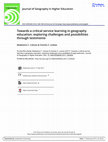
Journal of Geography in Higher Education, 2017
There has been an increasing interest in exploring the transformational possibilities of experien... more There has been an increasing interest in exploring the transformational possibilities of experiential learning approaches like service learning, across post-secondary education, including geography. At the same time, scholars caution that such initiatives can entrench neoliberalism, white supremacy and other power structures and call for implementing a critical service learning (CSL) approach that is rooted in action against injustice. In response, this paper uses testimonio methodology to explore the experiences of a student and instructor engaging in a graduate geography course that implements CSL. We demonstrate how CSL is a complex process that is mired in the very power structures and institutional barriers it attempts to disrupt. Nonetheless, CSL creates opportunities for social change in the classroom and community, which make it a promising pedagogical strategy for geographers aiming to create alternative teaching approaches in their classrooms.
Journal of Agriculture, Food Systems, and Community Development, 2015
Activists and academics have increasingly drawn on the concept of "food justice" in recent years.... more Activists and academics have increasingly drawn on the concept of "food justice" in recent years. While this trend is encouraging, we argue that a focus on "inclusion" by these actors may actually work to reproduce inequitable relationships. Food justice research and practice should thus move beyond inclusion to connect food system inequities to interlocking structures of oppression, such as capitalism, patriarchy, white supremacy, and colonialism. In Canada, placing food justice in the context of ongoing processes of colonialism-and recognizing that no justice can happen on stolen land-is particularly important. While we make these suggestions, we do not claim to have all the COMMENTARY ON RACE AND ETHNICITY IN FOOD SYSTEMS WORK

Studies in Social Justice
This paper explores how women and non-binary Latinx Community Workers (LCWs) in Toronto, Canada, ... more This paper explores how women and non-binary Latinx Community Workers (LCWs) in Toronto, Canada, negotiate their identities, citizenship practices and politics in relation to settler colonialism and decolonization. We demonstrate how LCWs enact a Latinx decolonial politic of belonging, an alternative way of practicing citizenship that strives to simultaneously challenge both Canadian and Latin American settler colonialism. This can be seen when LCWs refuse to be recognized on white settler terms as “proud Canadians,” and create community-based learning initiatives that incite conversations among everyday Latinx community members around Canada’s settler colonial history and present, Indigenous worldviews, as well as race and settler colonialism in Latin America. We consider how LCWs’ enactments of a Latinx decolonial politic of belonging serve as small, incomplete, but crucial steps towards decolonization.
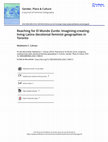
Gender Place & Culture, 2020
This paper explores how a multiracial network of women and non-binary Latinx Community Workers (L... more This paper explores how a multiracial network of women and non-binary Latinx Community Workers (LCWs) envision and enact social change in Toronto, Canada. I demonstrate how LCWs articulate and implement an intersectional feminist and decolonial politic in their community organizing practices, from remaking a non-profit organization and creating spaces of mutual support, hope, healing and love. I argue that these social-spatial struggles collectively form Latinx decolonial feminist geographies that reach for Gloria Anzaldúa’s El Mundo Zurdo. I situate El Mundo Zurdo as a Latinx decolonial, feminist and geographical theory of social change and bring it into conversation with feminist, Black and Indigenous geographies. Overall, this paper deepens understandings of Latinx geographies in theory and practice and demonstrates how Latinx geographies can work toward decolonial feminist futures.

Environment & Planning D: Society & Space, 2020
This paper explores the tensions racialized migrants negotiate when politically organizing and en... more This paper explores the tensions racialized migrants negotiate when politically organizing and enacting citizenship within the context of the Canadian white settler state. I focus on the experiences of Latin Americans in Toronto and the politics surrounding a cultural celebration-Hispanic Heritage Month. While some Latin Americans sought to use this event to gain recognition and assert their belonging to Canadian society, others opposed its naming, objectives and organization, and opted to create an alternative celebration-the Latin-America History Collective's D ıa de la Verdad/Day of Truth Rally. I demonstrate that the narratives and practices mobilized around Hispanic Heritage Month and Latin-America History Collective's Rally reveal how different forms of migrant political organizing can internalize, reproduce and contest white settler colonial social relations. Overall, this paper aims to contribute to and complicate debates on the fraught nature of racialized migrants' citizenship, politics and identity formation in Canada, by emphasizing the vast heterogeneity of Latin American communities and decolonizing possibilities.
Society & Space, 2019
There would be no Latinx geographies without Black geographies. What I mean by this is that Latin... more There would be no Latinx geographies without Black geographies. What I mean by this is that Latinx and Black geographies are inextricably linked, because Blackness and Latinidad are not mutually exclusive and because Black thought, experiences, history and politics, along with the legacy of transatlantic slavery, profoundly shape contemporary social and spatial arrangements in las Américas. These realities became indisputably clear for me as a Latina feminist geographer working closely with, and writing about, a diverse collective of Latinx community workers and activists struggling for social justice in the Greater Toronto Area, Canada.

Antipode, 2019
This paper explores how women and non-binary Latinx community workers (LCWs), in the Greater Toro... more This paper explores how women and non-binary Latinx community workers (LCWs), in the Greater Toronto Area, navigate multiple interlocking forces of oppression like racialisation, heterosexism and neoliberalism, when advancing social justice across the non-profit sector. Using an intersectionality framework in tandem with testimonio methodology, including 37 testimonios, a workshop and participant observation, I show how LCWs are constrained by, but also contest, a white neoliberal non-profit funding structure and patriarchal political system. I also explore how community work has contradictory effects on the mental, physical and economic wellbeing of LCWs. Lastly, I demonstrate how LCWs persist by weaving together their family and community histories , personal experiences and women of colour feminisms to enact a Latinx decolonial feminist praxis. I consider what lessons a Latinx decolonial feminist praxis can bring to bear on debates in human geography around neoliberalism, the non-profit sector and social justice transformation.
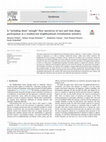
Geoforum, 2019
This paper explores how one neighbourhood revitalization initiative addresses-or fails to address... more This paper explores how one neighbourhood revitalization initiative addresses-or fails to address-intersecting systems of oppression as it seeks to facilitate resident-led change. Unlike many similar initiatives, the Neighbourhood Action Strategy in Hamilton, Ontario, Canada has an explicit focus on grassroots community development and resident leadership, and actors within the strategy have paid significant attention to issues of inclusion. We draw on in-depth interviews with City staff, local service providers, and neighbourhood residents, as well as on observation of neighbourhood meetings and media analysis, to explore how diversity, inclusion, and equity are understood and managed by different actors within the Strategy. We demonstrate that despite a stated mandate of inclusion, the initiative often struggles to engage significant participation from working-class and racialized people. We argue that this is in part due to complex interpersonal and institutional dynamics informed by race and class, which create significant tensions that ultimately limit the initiative's ability to create meaningful transformation. We conclude with some lessons learned about how to disrupt the racist, classist, and other oppressive discourses that can operate even within the most progressive initiatives.

Journal of Geography in Higher Education, 2017
There has been an increasing interest in exploring the transformational possibilities of experien... more There has been an increasing interest in exploring the transformational possibilities of experiential learning approaches like service learning, across post-secondary education, including geography. At the same time, scholars caution that such initiatives can entrench neoliberalism, white supremacy and other power structures and call for implementing a critical service learning (CSL) approach that is rooted in action against injustice. In response, this paper uses testimonio methodology to explore the experiences of a student and instructor engaging in a graduate geography course that implements CSL. We demonstrate how CSL is a complex process that is mired in the very power structures and institutional barriers it attempts to disrupt. Nonetheless, CSL creates opportunities for social change in the classroom and community, which make it a promising pedagogical strategy for geographers aiming to create alternative teaching approaches in their classrooms.

Activists and academics have increasingly drawn on the concept of "food justice" in recent years.... more Activists and academics have increasingly drawn on the concept of "food justice" in recent years. While this trend is encouraging, we argue that a focus on "inclusion" by these actors may actually work to reproduce inequitable relationships. Food justice research and practice should thus move beyond inclusion to connect food system inequities to interlocking structures of oppression, such as capitalism, patriarchy, white supremacy, and colonialism. In Canada, placing food justice in the context of ongoing processes of colonialism—and recognizing that no justice can happen on stolen land—is particularly important. While we make these suggestions, we do not claim to have all the answers; we struggle through the same tensions we raise here in our own work. Nonetheless, we feel that encouraging those interested in food activism to consider intersecting systems of domination, to challenge such structures and their complicity in them, and to build solidarity with other activists, perhaps using land as the basis for new conversations and alliances, may be key steps toward cultivating an anti-colonial food justice praxis.

Social Science & Medicine, 2014
There is a renewed interest in the potential of municipal governments working collaboratively wit... more There is a renewed interest in the potential of municipal governments working collaboratively with local communities to address health inequities. A growing body of literature has also highlighted the benefits and limitations of participatory approaches in neighbourhood interventions initiated by municipal governments. However, few studies have investigated how neighbourhood interventions tackling health inequities work in real-time and in context, from the perspectives of Community Developers (CDs) who promote community participation. This study uses a process evaluation approach and semi-structured interviews with CDs to explore the challenges they face in implementing a community development, participatory process in the City of Hamilton's strategy to reduce health inequities - Neighbourhood Action. Findings demonstrate that municipal government can facilitate and suppress community participation in complex ways. CDs serve as significant but conflicted intermediaries as they negotiate and navigate power differentials between city and community actors, while also facing structural challenges. We conclude that community participation is important to bottom-up, resident-led social change, and that CDs are central to this work.










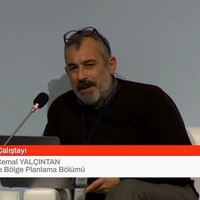
Uploads
Papers by Madelaine C Cahuas